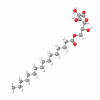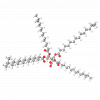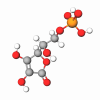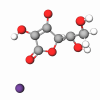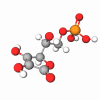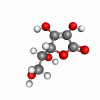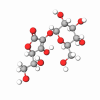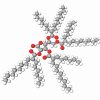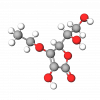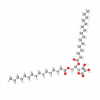Ascorbic Acid Polypeptide is a vitamin C peptide complex also known under the trade name Vitazyme® C. Compared with a synthetic vitamin C (L-ascorbic acid), which is unstable in preparations, it has good stability in water solutions and other aqueous systems. It is a free-flowing white-to-cream powder with a light fruity odor whose L-ascorbic acid content is 18 – 23% in mass.
In nature, vitamin C is widespread in the plant and animal kingdoms. Oranges, berries, cherries, and fresh tea are all natural sources of L-ascorbic acid. Naturally occurring vitamin C is bound to water-soluble proteins, peptides, and related compounds, like bioflavonoids.
Scientific studies showed that the bioavailability of Vitamin C in the case of oral administration depends on the composition of the preparation. Most amounts of synthetic ascorbic (up to 90%) acid are not accessible to the body, but if it is taken with fresh citruses, the bioavailability level significantly rises.
Ascorbic acid polypeptide is structurally close to Vitamin C deposits in citruses, so it is one of the most bioavailable, effective, and stable forms of its derivatives used in personal care applications. In addition, it is an edible additive used in the food industry, so it is a safe ingredient for skin care preparations.Thanks to conjugation with peptides, Ascorbic Acid Polypeptide can penetrate deep into the epidermis, boost collagen production, protect cells from free radicals, and brighten the skin tone. It effectively fights against formed freckles, excessive dark spots, and age spots.
When the British Navy gave each sailor one to two pomeloes a day, they discovered it could prevent scurvy. Each fresh sour pomelo contains 4 to 6 milligrams of the vitamin combination. The recommended daily vitamin C intake is 60 mg, sufficient to prevent scurvy.
The difference in data from 10 to 1 reflects that the efficiency of the vitamin conjugate (peptide complex) is much higher than that of the synthetic complex component. Studies demonstrate that oral administration of Ascorbic Acid Polypeptide increases plasma levels 24 hours after administration and that ascorbic acid is almost entirely excreted from the body after 6 to 8 hours. Vitamin C plays a vital role in many metabolic processes. Since the human body cannot synthesize it, it must be taken daily.
Vitamin C is necessary for synthesizing hydroxyproline, the precursor of collagen, osteoid, and dentin. Ascorbic acid is also needed for the immune system, wound healing, and to strengthen capillaries to prevent them from becoming brittle and bleeding under the skin. It is a potent antioxidant, skin whitening, and reducing agent.
